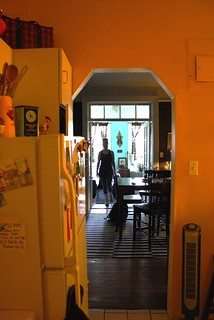When Council Member Rosie Mendez joined the residents of three buildings on Third Street last month to protest the non-renewal of their leases, Sue Palchak-Essenpreis vowed to stay put past the end of her lease on May 14. And she did just that: her one-bedroom apartment is still jam-packed with bookshelves, and plants are perched on almost every windowsill. But last night, she signed a new lease for an apartment in Washington Heights. On July 4, she’ll move out of her third-floor apartment at 50 East Third Street. But first, she has an appointment downtown.
On Friday, she and her husband Greg Essenpreis will appear in Housing Court in hopes that a judge will keep them from having to pay the legal fees of their landlord, Abe Haruvi. That would mark the end of the high-profile protest against the owner of 50, 54, and 58 East Third Street, who did not renew the leases of some 17 tenants whose contracts with his company, Abart Holdings, were running out this summer. After a few months of outcry, most of the buildings’ residents are now moving on.
Since Ms. Palchak-Essenpreis began organizing tenants, she said, there has been more fleeing than fighting. “There has been a different moving truck in front of the building almost every day for the last two weeks,” she admitted. “After I sent off the e-mail – ‘We’re going to court!’ – it was like a cartoon: everyone ran off.”
In April, Ms. Palchak-Essenpreis wrote an impassioned account outlining the path she hoped tenants would take: “We Occupy. We stay in our homes. We organize, we unite, and we don’t leave.” She stayed because she didn’t have the money for a move or sufficient time to prepare for it, she said, but she realized the law was not on her side. She continued to pay her market-rate $2,300-per-month rent after her lease expired in May; meanwhile Mr. Haruvi is seeking $3,500 for each of the two months she has remained, plus his legal fees, said Ms. Palchak-Essenpreis.
That courtroom drama is something other tenants, like 26-year-old Caroline Grass, decided to avoid. This weekend, Ms. Grass will move three blocks from her apartment at 58 East Third Street to a building between Avenues A and B.
“As much as I loved the building, I didn’t want to start that messy battle with the landlord,” she said. “I don’t have the time to deal with lawyers, with housing court. I’m a young individual working in the East Village.” She added, “It’s very anticlimactic — that’s it. But I’m not going to occupy somewhere illegally.”
David Moster, a Ph.D. candidate at N.Y.U. who lives at 50 East Third Street, is getting ready to move into an apartment on the Upper West Side when his lease expires in July. “What are you going to do?” he said. “They’re within the right of the law. The law allows people to do rude things.”
All three tenants said they had heard nothing about the future of the buildings beyond the initial letter stating that they would be sold. Vanessa Diaz Lopez, Rosie Mendez’s chief of staff, said the councilwoman reached out to the landlord on Monday but had not heard back. Abe Haruvi did not respond to requests for comment, and his lawyer, Anthony LeCrichia, could not be reached.
For one family living at 50 East Third Street, the building’s sale is especially worrisome. The wife of the superintendent of the three buildings, who would identify herself only as Ms. Aguilar, said she was certain that she, her husband and their four children would have to leave their basement apartment once the transaction takes place.
They’re hoping for three months notice and for Mr. Haruvi to move them to one of his other buildings, she said, though she hadn’t heard many details. “He’s kind of willing to give us a hand, because we have four children and can’t be outside on the street,” she said. “So as soon as they make a deal, we’re hoping the boss can do something. Other than that, we’d be in big trouble.”
Ms. Aguilar estimated that the buildings were still about two-thirds full, as all of the rent-stabilized tenants remain, along with others whose leases aren’t expiring soon.
Those who’ve decided to leave have faced daunting apartment hunts. Ms. Grass looked at 100 apartments before deciding on her new place. “I feel like a year ago, you could find diamonds in the rough,” she said. But this time around, she had to contend with even higher rents and even less space. She said three of her four monthly paychecks would now go toward rent.
Ms. Palchak-Essenpreis and her husband, meanwhile, were unable to find anything nearby that was comparable to their current $2,300-a-month one-bedroom. It wasn’t until she began apartment hunting in earnest, she said, that she truly grasped the realities of the East Village real estate market.
“I see what we’re sitting on, and I understand why,” she said. “I always thought we paid a lot in rent, but it’s nothing. Not even close.”







